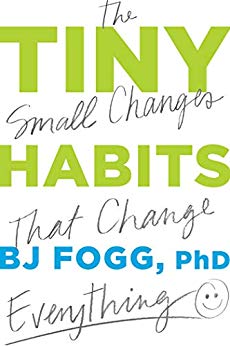More on this book
Community
Kindle Notes & Highlights
by
B.J. Fogg
Read between
November 29 - December 17, 2023
In order to design successful habits and change your behaviors, you should do three things. Stop judging yourself. Take your aspirations and break them down into tiny behaviors. Embrace mistakes as discoveries and use them to move forward.
The essence of Tiny Habits is this: Take a behavior you want, make it tiny, find where it fits naturally in your life, and nurture its growth.
With the Tiny Habits method, you focus on small actions that you can do in less than thirty seconds.
We live in an aspiration-driven culture that is rooted in instant gratification. We find it difficult to enact or even accept incremental progress.
A behavior happens when the three elements of MAP—Motivation, Ability, and Prompt—come together at the same moment. Motivation is your desire to do the behavior. Ability is your capacity to do the behavior. And Prompt is your cue to do the behavior.
The easier a behavior is to do, the more likely the behavior will become habit.
You can disrupt a behavior you don’t want by removing the prompt. This isn’t always easy, but removing the prompt is your best first move to stop a behavior from happening.
EXERCISE #1: EXPLORE WAYS TO STOP A HABIT The Fogg Behavior Model applies to all types of behavior change. In this exercise, you’ll explore simple ways to stop a habit. Step 1: Write down three habits that you’d like to stop. Try to be specific. For instance, write “Stop buying soda for lunch” rather than “Stop drinking soda.” Step 2: For each habit, think of ways you might remove (or avoid) the prompt. If you can’t think of anything, that’s okay. Move on to the next step. Step 3: For each habit, think of ways to make it harder to do (ability). Step 4: For each habit, think of ways to
...more
one hundred million people enroll in an online course, but the vast majority drop out. Most studies show that less than 10 percent cross the finish line.
Aspirations are abstract desires, like wanting your kids to succeed in school. Outcomes are more measurable, like getting straight As second semester. Both of these are great places to start the process of Behavior Design.
A Golden Behavior has three criteria. The behavior is effective in realizing your aspiration (impact) You want to do the behavior (motivation) You can do the behavior (ability)
Do you have enough time to do the behavior? Do you have enough money to do the behavior? Are you physically capable of doing the behavior? Does the behavior require a lot of creative or mental energy? Does the behavior fit into your current routine or does it require you to make adjustments?
The Three Approaches to Making a Behavior Easier to Do 1. INCREASE YOUR SKILLS
2. GET TOOLS AND RESOURCES
3. MAKE THE BEHAVIOR TINY
Emotions create habits. Not repetition. Not frequency. Not fairy dust. Emotions.
rewards need to happen either during the behavior or milliseconds afterward.
After I walk into the kitchen, I will drink a big glass of water.
After I turn on the shower, I will do three squats (and maybe more).
After I eat lunch, I will walk around the building at least once.
After I put my computer to sleep at the end of the day, I will tidy my work desk quickly.
After I start the dishwasher, I will tidy up at least one thing on the counter.
After I sit down for breakfast, I will open my calendar app and review the day’s agenda.
After I select my top priority for the day, I will start my Pomodoro timer.
After I hang up the phone, I will do a quick set of push-ups or squats.
After I get back home after errands, I will open the Duolingo app.
After I take a coffee break midday, I will text my spouse a message of appreciation.
After I set my timer, I will put on my headphones to signal to others that I shouldn’t be disturbed.


